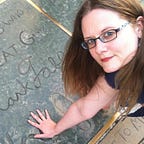Humpty Dumpty, or Lessons in Voice
When writers say someone has “voice,” what does that mean? As a concept, voice can be hard to describe, but we know when we read it. Voice is that thing that sets you apart, that makes your writing identifiably yours. More than a tone or an approach that permeates the story, voice can sometimes be the story, determining what a writer leaves in and what she takes out. It’s the mystical thing in any piece that makes it exclusively YOU.
For those looking to better hone voice, DIY MFA author Gabriela Pereira offers some advice: Rewrite Humpty Dumpty. Not in the way that you would tell it (though you’re welcome to give that a try), rather as your favorite writers would. Through trying to mimic their voice, we come to better understand the concept of voice itself. Just what exactly makes Jack Kerouac different from Jane Austen? When you’re done, read your retellings over to learn what sets these writers apart from you.
Here are four examples to get you started:
Jane Austen
It is a truth universally acknowledged that an egg placed upon a wall must fall. That this happened in view of the king’s men as they rode out that morning upon their horses was tragic, causing much distress for the — -shire regiment, as in the end there was altogether nothing they could do. The egg was simply unfit for reassembly.
